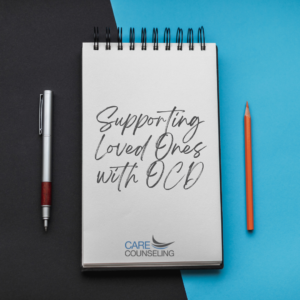 When a friend or family member is struggling with OCD, it can be hard to what to do.
When a friend or family member is struggling with OCD, it can be hard to what to do.
Family and friends may become quite involved in one’s rituals. When an individual is confronted on their behaviors, the range of experiences can include anxiety, panic attacks, disgust, and feelings of unsettledness. The time spent on compulsions is time-consuming or causes significant distress. Avoidance of situations, disruption or delay of plans, and distress within relationships are a few examples.
While trying to be helpful, friends and family may unintentionally continue to negatively reinforce OCD by doing things such as checking, repeating, and offering reassurance.
This blog is full of resources that can help provide more information on how to support loved ones in addition to options for treatment.
Educate Yourself
Learn more about what-you-need-to-know about obsessive-compulsive disorder by finding a reputable source such as the International OCD Foundation. Reading books on OCD, talking to a mental health professional with specialized training in treating OCD, and asking questions are all great ways to help educate yourself. Many of the links below include lists of valuable resources. https://iocdf.org/
https://adaa.org/understanding-anxiety/co-occurring-disorders/obsessive-compulsive-disorder
Pay Attention to Behaviors that Signal OCD or Worsening of Symptoms
- Did you know that on average, it takes 17 years before getting treatment for OCD?
Family and friends can help their loved ones recognize behaviors that may signal OCD such as excessive time engaging in rituals such as grooming or homework, repetitive behaviors, the need for excessive reassurance, increased concern over small details, avoidance, and irritability/ mood changes to things that are becoming a daily struggle. Being aware of family-guidelines can be helpful when living when sharing a space with a family member with OCD.
Be Patient and Emphasize
It can be frustrating for friends and family to cope when their loved one is struggling. Imagine the distress of intrusive and unwanted thoughts, images, or impulses. These can be very uncomfortable, even repulsive depending on the content. Fear, shame, discomfort, panic, doubt, disgust…these are all common feelings.
Some individuals may not be ready for treatment such as Exposure and Response Prevention Therapy and continue to struggle with symptoms, despite an awareness of the obsessions and compulsions. Being patient can be difficult, yet it is important to remember that everyone makes progress at their own pace. Recognizing small improvements can be very helpful since even the smallest changes with not engaging in compulsions can make a big difference over time.
Learn how to Support Without Reinforcing Compulsions
Those who live with someone with OCD may find themselves avoiding situations that are upsetting to the individual. These can be especially true in families where it is easier to avoid the aftermath of anxious distress such as tantrums or panic attacks. Other situations include accommodating friends or family or engaging in behaviors such as providing reassurance. Behaviors can significantly impact families and friends who may be tempted to accommodate rituals to avoid distress. Learning how to support someone experiencing obsessions and compulsions without reinforcing the compulsion is important. Working with a therapist can be helpful to provide specific strategies that are tailored to your individual needs.
Learn about Treatment Options and Available Resources
Learn more about effective treatment options for OCD, including providers who utilize CBT and have training in Exposure and Response Prevention (ERP) Therapy which is considered the “gold standard” in treatment. Find_an_Ex/RP Therapist. Finding therapists/ clinics who have therapists available can help make it easier to support family members or friends who are struggling. Knowing about local OCD support groups and resources can be helpful as well as medication options. Consider attending sessions or support group meetings with your loved one.
OCD Support Groups & Virtual Support
https://iocdf.org/support-groups/twin-cities-ocd-support-group/
https://www.ocdtc.org/resources/
https://iocdf.org/peaceofmind/
Books and Apps
Local Therapy Options
https://rogersbh.org/resources
https://www.anxietytreatmentresources.com/
Written By: Charlotte Johnson, MA, LPCC
We’re Here to help
Our wellness experts will be happy to take care of you. You can CLICK HERE to schedule an appointment now or call (612)223-8898.
Meet Clinicians
We’re united by our commitment to providing effective, relevant, and innovative mental health support at all stages of your journey. Click Here to find out more about who we are, where we come from, and how we live out CARE’s mission every day.
The professionals at CARE are actively collecting and creating resources to help with what you need. We’re Here for You.



